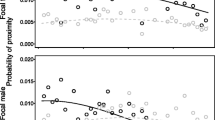Abstract
Observations of dominance relations in a large group of rhesus monkeys on Cayo Santiago were carried out over a period of 25 months. Dyadic interactions in which an aggressive gesture in one individual was followed by a submissive gesture in the other were recorded as ‘fights’ and considered reliable indices of dominance. The analysis revealed the following characteristics: (1) Maternal dominance over female offspring; (2) maternal dominance over male offspring up the age six years at which time the son leaves his natal group or remains in the group and rises in rank over his mother; (3) dominance of older brothers over younger male siblings until the age of five years at which time the younger brother rises in rank; (4) rank reversal between sisters when the younger sister reaches the age of three to four years; (5) brother-sister relative rank dependency on age until the male sibling reaches three to four years at which time he rises in rank; (6) linear dominance relations in the crossgenealogical dominance hierarchy; and (7) linear, but unstable, dominance relations in the adult male hierarchy. With few exceptions, the pattern of genealogical, cross-genealogical, and adult male dominance relations in the group under study was consistent with data reported for a small social group (group F) on Cayo Santiago and for Japanese macaques.
Similar content being viewed by others
References
Altmann, Stuart A., 1962. A field study of the sociobiology of rhesus monkeys,Macaca mulatta.Ann. New York Acad. Sci., 102 (2): 338–435.
Kaufmann, J., 1967. Social relations of adult males in a free-ranging band of rhesus monkeys. In:Social Communication Among Primates S. A. Altmann (ed.), University of Chicago Press, Chicago, pp. 73–98.
Kawai, M., 1965a. On the system of social ranks in a natural troop of Japanese monkeys: (I) Basic rank and dependent rank. In:Japanese Monkeys, S. A. Altmann (ed)., Published by the author, pp. 66–86.
--, 1965b. On the system of social ranks in a natural troop of Japanese monkeys: (II) Ranking order as observed among the monkeys on and near the test box. In:Japanese Monkeys, S. A. Altmann (ed.), Published by the author, pp. 87–104.
Kawamura, S., 1965. Matriarchal social ranks in the Minoo-B troop: A study of the rank system of Japanese monkeys. In:Japanese Monkeys, S. A. Altmann (ed.), Published by the author, pp. 105–112.
Koford, Carl B., 1963. Group relations of rhesus monkeys. In:Primate Social Behavior Charles H. Southwick (ed.), Van Nostrand, Princeton, New Jersey, pp. 136–152.
Sade, D. S., 1967. Determinants of dominance in a group of free-ranging rhesus monkeys. In:Social Communication Among Primates S. A. Altmann (ed.), University of Chicago Press, Chicago, pp. 99–114.
--, 1969. An algorithm for dominance relations among rhesus monkeys: Rules for adult females and sisters. Paper presented at the Annual Meeting of American Association of Physical Anthropologists, April 10–12, 1969, Mexico City, Mexico.
--, in press. A longitudinal study of social behavior of rhesus monkeys. In:Functional and Evolutionary Biology of Primates,R. A. Tuttle (ed.), Aldine, Chicago.
Southwick, C. H., Mirza Azhar Beg, &M. Rafiq Siddiqi, 1965. Rhesus monkeys in North India. In:Primate Behavior I. DeVore (ed.), Holt, Rinehart, & Winston, New York, pp. 111–159.
Author information
Authors and Affiliations
About this article
Cite this article
Missakian, E.A. Genealogical and cross-genealogical dominance relations in a group of free-ranging rhesus monkeys (Macaca mulatta) on Cayo Santiago. Primates 13, 169–180 (1972). https://doi.org/10.1007/BF01840878
Received:
Accepted:
Issue Date:
DOI: https://doi.org/10.1007/BF01840878




